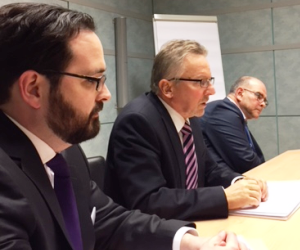Prior to its study tour to Pakistan and India, the Course for Senior Officials met with the working group of Young Leaders in Security Policy of the Federal Academy to discuss future scenarios for the Indian subcontinent.

In what direction are societies on the Indian subcontinent developing? This is just one of the questions discussed by the Course for Senior Officials and the Young Leaders in Security Policy working group (Image: A street in Chennai, India). Picture: McKay Savage/Wikimedia/CC BY 2.0
How will the wider region surrounding India, Pakistan, and Afghanistan develop in future? Can the Kashmir conflict between India and Pakistan be resolved? And how is the region influenced by international powers such as the United States and China? In order to give impetus to an exchange of ideas with high-ranking participants of the Course for Senior Officials, four members of the Young Leaders in Security Policy working group started by presenting possible development scenarios for the Indian subcontinent.
Scenarios to encourage debate
Sebastian Feyock concentrated on the possibility of an escalation of local conflicts in his remarks. While a trend towards stabilisation might be achieved in Pakistan's neighbouring country Afghanistan through Chinese pressure, Feyock stated, there were signs at the same time of an impending escalation in the Kashmir region of the existing conflict between India and Pakistan. Based on this scenario, Ingmar Zielke presented possible ways of rapprochement between Pakistan and India in his statement. According to him, an important step towards rapprochement could be the China-Pakistan Economic Corridor, which is based on Chinese investments. The resulting opportunities for action as well as the influence of Beijing could have a stabilising effect on Pakistan. This would, however, require a detente in the relations between China and India, which currently perceive themselves as competitors.

President Dr Karl-Heinz Kamp (middle), Course Director Colonel (GS) Peter Härle (right) and Chairman of the Working Group Christian Klein (left) during a discussion with the participants.
Image: BAKS/Wagner
While Corinna Blutguth in her scenario identified ways of reducing conflict potential, for instance a new course by the Pakistani side regarding its support of the Taliban in Afghanistan, she described the rivalry between the parties to the conflict as so muddled that, without a game changer – such as new incentives for mediation by a third country – the status quo would most likely be maintained. A fourth scenario was described by Kathleen Böhme, who placed her focus on the effects of climate change in the region. Bangladesh, she stated, faced losing a large part of its agricultural area in the coming years owing to rising sea levels. The resulting migration movements both within the country and towards neighbouring countries would lead to social tension and an enormous potential for conflict on the Indian subcontinent.
Emphasising the relevance for Germany and Europe
Based on these presentations, a subsequent discussion developed on short- and medium-term development possibilities in the region. While the possibilities of individual scenarios actually happening were met with varying degrees of agreement, all participants were in agreement regarding the global influence of this region – including on Germany and Europe. After the discussion, Bernd Schaller, Dean of the Catholic Military Episcopal Office in Berlin and the evening's host, accompanied his guests to the in-house chapel. There he talked about the tasks of the military chaplaincy and then let the participants have a moment of quiet in the chapel.

Military Dean Bernd Schaller kindly let the participants use the premises of the Catholic Military Episcopal Office in Berlin-Mitte. Picture: BAKS/Wagner
This has been the fourth time that the participants of the Course for Senior Officials of the Federal Academy for Security Policy and the members of the Young Leaders in Security Policy working group have met in this format to debate. Both sides have used this opportunity for lively discussions and the chance to benefit from new perspectives and experiences. The three-week Security Policy Course for Senior Officials unites high-ranking officials from the public service, business and society to join in an interministerial debate on subjects of security policy that are relevant to the future – this year with a focus on the Indian subcontinent. The Young Leaders in Security Policy working group, which was founded in 2015, reaches out to young experts in cooperation with the Association of Friends of the Federal Academy for Security Policy so they can contribute to the work of the Academy and form networks.
Author: Tobias Lücke
(translated)
